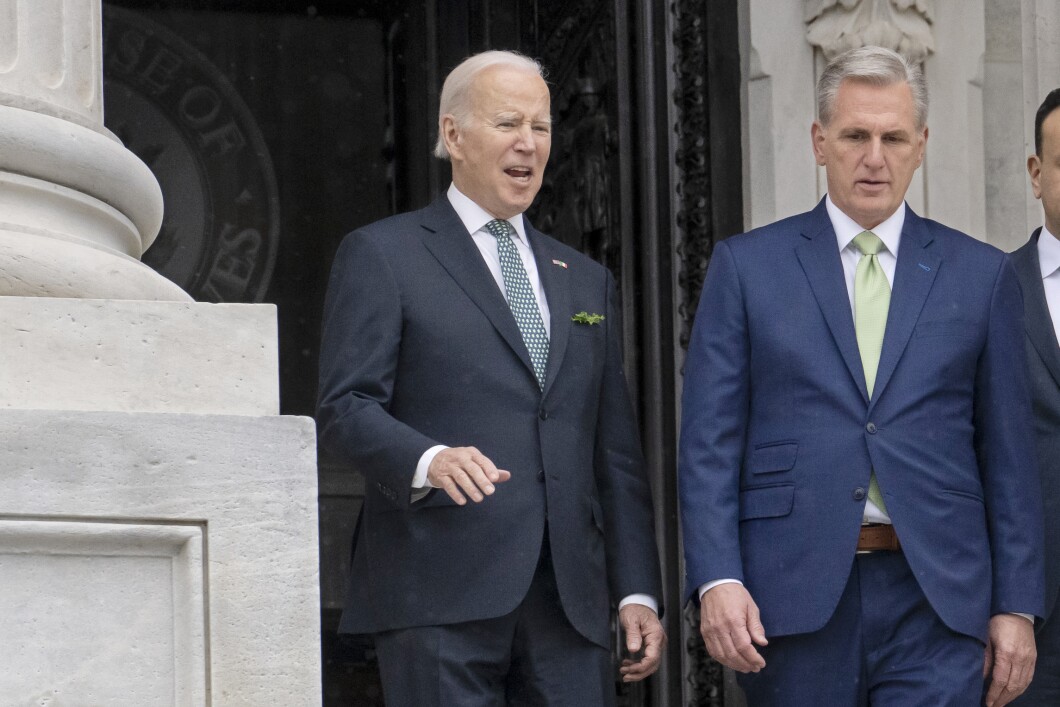
A reporter asked White House press secretary Karine Jean-Pierre during Monday’s briefing whether President Joe Biden’s position was that he would not meet with House Speaker Kevin McCarthy (R-CA) “until McCarthy gives in.”
Her answer sounded a lot like “yes.”
THE DEMOCRATS’ BIDEN WAITING GAME IS FINALLY OVER

“The president said he’s happy to meet with McCarthy but not on whether or not the debt limit gets extended,” Jean-Pierre said. “That’s not negotiable.” She later added, “We’ve been very clear on what we will negotiate about, which is appropriations and the budget.”
By Monday evening, the White House had changed its tune ever so slightly, requesting a May 9 meeting with McCarthy and other top congressional leaders from both parties. McCarthy hasn’t given in yet.
“This afternoon, President Biden called Speaker McCarthy, who is leading a CODEL in Israel, to invite him to a meeting at the White House on May 9 with [House Minority] Leader [Hakeem] Jeffries, [Senate Majority] Leader [Chuck] Schumer, and [Senate Minority] Leader [Mitch] McConnell, who the President also called today,” the White House said in a statement.
Biden isn’t blinking yet. “President Biden will stress that Congress must take action to avoid default without conditions and invited the four leaders to the White House to discuss the urgency of preventing default, as well as how to initiate a separate process to address the budget and fiscal year 2024 appropriations,” a White House official said.
It is a slight shifting of the goalposts and change of tactics, however. Two things have forced the White House’s hand.
Treasury Secretary Janet Yellen indicated in a letter to McCarthy and other congressional leaders that the U.S. would risk default absent a debt ceiling increase as early as June 1, conceding “the actual date that Treasury exhausts extraordinary measures could be a number of weeks later than these estimates.”
This nevertheless means that Biden and his Capitol Hill interlocutors may have less time to reach a deal and resolve the crisis than originally anticipated. The Congressional Budget Office has similarly revised its timeline based on federal receipts being less than projected previously.
McCarthy’s House has passed, however narrowly, a set of spending cuts paired with a debt limit extension of $1.5 trillion or until March 31, 2024, whichever comes first. While that exact package cannot survive in its present form, this happened much earlier than Democrats expected, and the Democratic Senate has yet to be able to pass a clean debt ceiling extension.
Even before McCarthy prevailed on the first vote, congressional Democrats were starting to splinter over debt ceiling talks. Many, including key swing vote Sen. Joe Manchin (D-WV), concluded that negotiations were necessary.
The White House has appeared confident, based on past showdowns over either the debt ceiling or government funding, that Democrats could win this argument. Biden, as vice president, was involved in negotiations that led to spending cuts and a delayed resolution of the debt ceiling, which was followed by a credit rating downgrade. He has therefore wanted to avoid a repeat.
Government shutdowns sapped the momentum of the Newt Gingrich-led Republican majorities. The debt ceiling showdown under former President Barack Obama similarly dissipated the Tea Party House majority’s political capital. In both cases, the Democratic incumbents were subsequently reelected as president, recovering from much poorer midterm election showings than Democrats experienced on Biden’s watch last year.
Nevertheless, Biden faces significant risks from default himself. He already receives poor marks on the economy, with growing GDP and low unemployment. A default or near-default would raise the risk of a recession, likely making those approval ratings worse and endangering his reelection prospects. And it’s worth noting that while Obama and former President Bill Clinton were reelected after their fiscal fights, Republicans also retained their House majorities both times.
Republican pollsters have also detected signs they could win this debate. An April American Viewpoint poll of 87 battleground congressional districts conducted for American Action Network found that 50% oppose raising the debt ceiling without cutting government spending. A larger majority of independents lean toward the Republican position.
An Echelon Insights poll found that 74% thought Biden should “agree to negotiations and try to find common ground around the debt ceiling” that would include “some reductions in government spending” as opposed to 26% who said he shouldn’t negotiate but instead insist on a clean increase “without any other provisions.”
That choice may not be the way the debate is framed in the media heavily consumed by swing voters. It also does not guarantee that voters, who like negotiations and spending cuts in the abstract, will back the specific cuts Republicans are proposing. But there is at least some evidence that the GOP position can be reconciled with public opinion.
Both Biden’s presidency and McCarthy’s speakership hang in the balance, as do things of even greater consequence.
“We have learned from past debt limit impasses that waiting until the last minute to suspend or increase the debt limit can cause serious harm to business and consumer confidence, raise short-term borrowing costs for taxpayers, and negatively impact the credit rating of the United States,” Yellen wrote. “If Congress fails to increase the debt limit, it would cause severe hardship to American families, harm our global leadership position, and raise questions about our ability to defend our national security interests.”
CLICK HERE TO READ MORE FROM THE WASHINGTON EXAMINER
While the two sides remain far off, if Biden and Democrats get into a room with McCarthy and McConnell, there is no telling what might happen.
On Monday night, we got one step closer to that happening.





